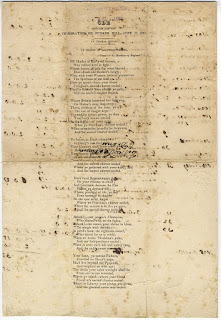The Battle of Bunker Hill was on June 17, 1775 and actually occurred on nearby Breed’s Hill in Charlestown. The British won the battle and took the hill, but it was a much more costly endeavor than had been imagined at the start. The well-organized British army had not expected much from the American militia, but as they advanced on the hill they were pushed back twice and experienced a high number of casualties - 1,054 British soldiers and officers died during the battle or afterward from wounds. On the American side, there were 400 casualties, and among those was Dr. Joseph Warren, a leading member of the patriot cause who was serving as the President of the Massachusetts Provincial Congress at the time of his death. Dr. Warren had been commissioned as a major general just before the battle, but rather than relying on his rank and staying in the back of the fray, he chose to serve as a private. In the ode, he is acknowledged with the following stanza:
Ye shades of martyred heroes,
Who rallied here to fight;
Whose hearts of oak the onset braved
That shook old Bunker’s height;
Who, with your WARREN, proved yourselves
The Spartans of the field;
Here ye stood -- here your blood
Freedom’s sacred charter sealed.
Here to Liberty your pledge ye gave,
And the sacred charter sealed.
Composed by Thomas Wells, “Ode Written for the Celebration on Bunker Hill, June 17, 1825” was part of a celebration that included the laying the cornerstone of the Bunker Hill Monument. More than 100,000 people were in attendance, including almost 200 veterans of the battle. The ceremony was presided over by the Marquis de Lafayette, a key military leader from the Revolutionary War, and also included an oration by Daniel Webster, who was serving as a United States Representative for Massachusetts 1st District at the time.
The ode is set to the tune of “Ye Mariners of England,” a patriotic British war song by Scottish poet Thomas Campbell. This may seem like an odd pick for a song that honors one of the first and most famous battles of the American Revolution, but it must have been a popular early 19th-century tune, as it was also used for a song honoring George Washington’s birthday and a restoration of peace in February 1815.
Sometimes the printed material in Special Collections will have handwritten notations on the back, or verso, of the page. When I am on-site, I can easily examine the physical object to determine what these notations are. In this instance, I only have access to the digital copy but I can tell that something was written on the verso of the page because the ink has bled through the page. Once the library reopens, I’ll retrieve the item from storage to see the notations, so watch this space for a follow-up reveal! In the meantime, based on the spacing and what looks like a combination of both letters and numbers, I'm making a guess that it is a ledger or tally of some sort. Unfortunately, the ink bleeding from those notations has completely obscured one entire stanza of the ode, but I was able to find a copy of the ode in the online collection of the Library of Congress and have transcribed that missing section below:
Ye brave, in death triumphant!
In Glory’s rest that sleep;
Your Country shall your ashes guard,
Her watch around you keep; --
Your Spirits here that walk abroad,
Have no unheard appealed
From the sod where ye trod,
And the sacred charter sealed;
Where ye gathered with your hearty few,
And the sacred charter sealed.
Take a closer look at all of the lyrics, and see if you can decipher what’s written on the verso, by clicking the image above or checking out the full size version on DSpace.
Elizabeth Roscio
Preservation Librarian
